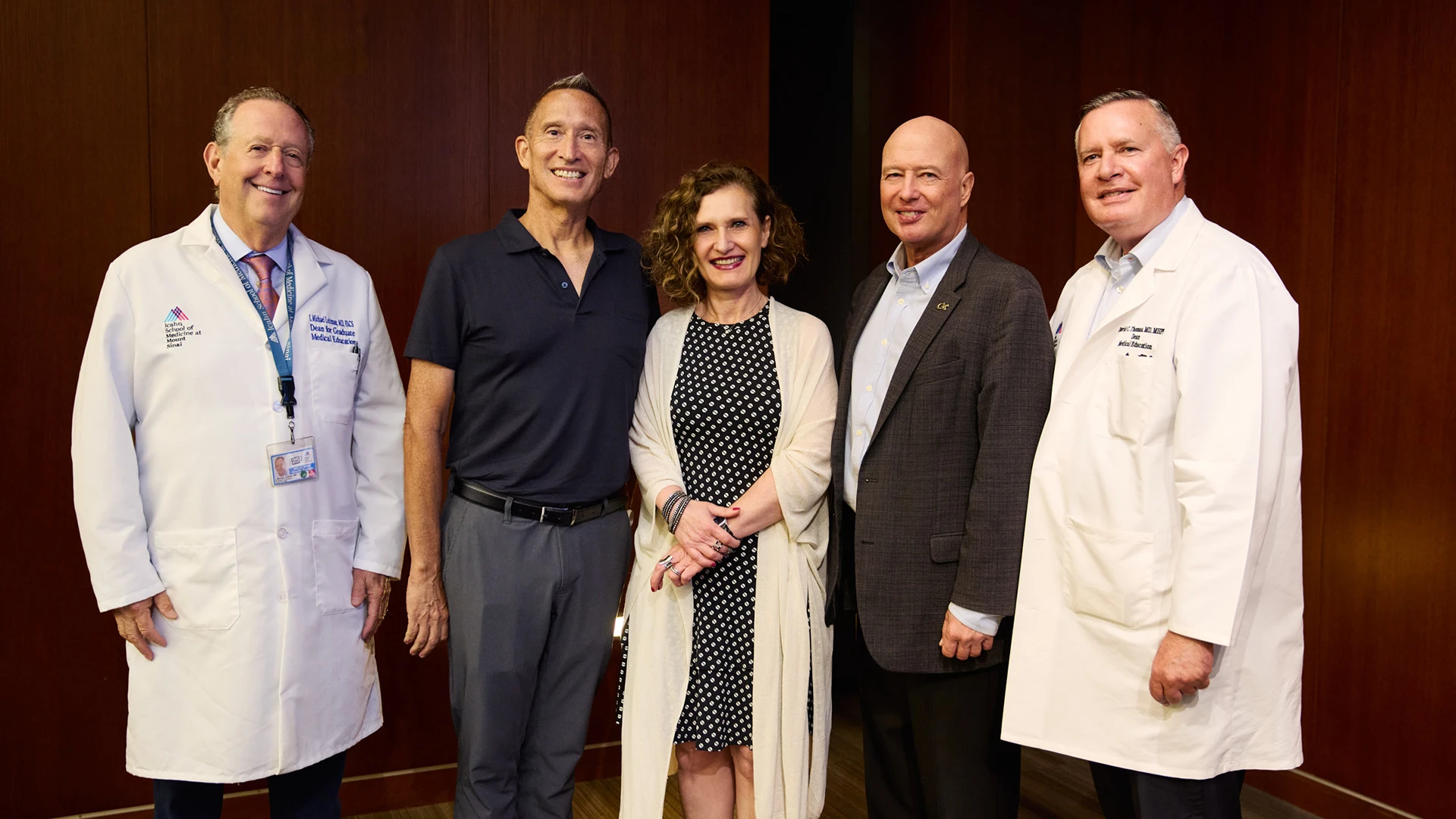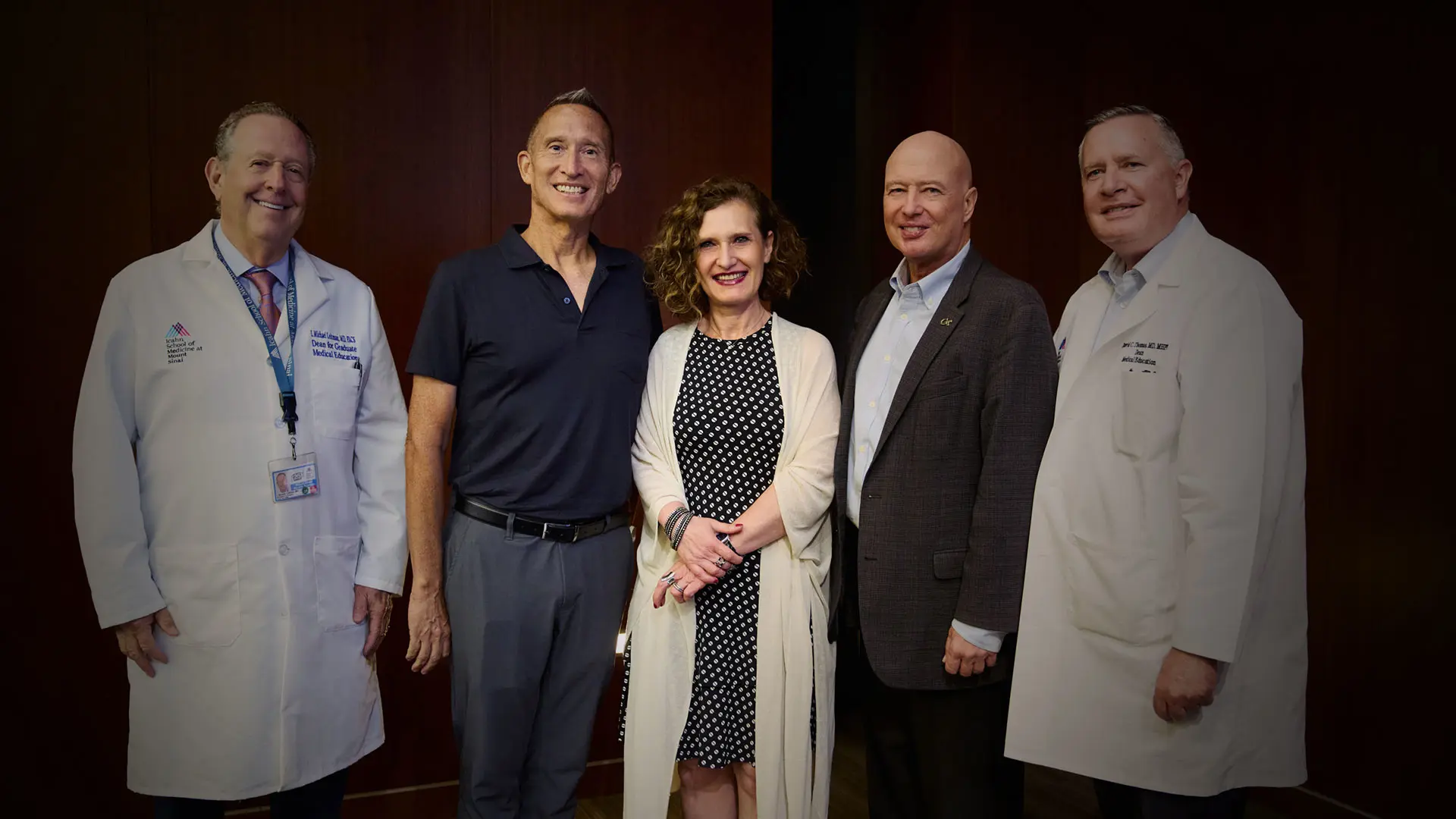“From generative models that can support teaching and assessment to adaptive tools that personalize learning experiences, AI is no longer a distant concept—it is here and already reshaping how we teach, learn, and think,” Marta Filizola, PhD, told the audience. Dr. Filizola is the Graduate School Dean and Sharon and Frederick Klingenstein/Nathan Kase, MD Professor of Pharmacological Sciences, and Professor of Neuroscience, and Artificial Intelligence and Human Health.
“Our goal today is not only to introduce ideas and showcase innovation but also to foster dialogue, curiosity, and collaboration,” added Dr. Filizola. “We hope the conversations that begin here will continue across classrooms, departments, and disciplines.”

From left: I. Michael Leitman, MD; José Antonio Bowen, PhD; Marta Filizola, PhD; Stephen Harmon, EdD; and David C. Thomas, MD, MS, MHPE
The symposium took place July 24 on the Icahn School of Medicine at Mount Sinai campus. Dr. Filizola co-hosted the event with David C. Thomas, MD, MS, MHPE, Dean and Professor of Medical Education, and Professor of Medicine, and Rehabilitation and Human Performance, and I. Michael Leitman, MD, Dean of Graduate Medical Education, and Professor of Surgery, and Medical Education.
The symposium provided a forum for expert-led discussions and best practices in AI integration. Headlining the event were Stephen Harmon, EdD; and José Antonio Bowen, PhD. Dr. Harmon, whose research focuses on the educational applications of emerging technologies, is Executive Director of the Center for 21st Century Universities, and Associate Dean of Research and Professor in the Georgia Tech College of Lifetime Learning. Dr. Bowen has been at the forefront of innovation in higher education for more than four decades, with leadership roles at Stanford University, Georgetown University, and the University of Southampton, and as a dean at Miami University and Southern Methodist University. He is also a former president of Goucher College.

At the inaugural AI in (Bio) Medical Education: Innovation in Teaching and Learning symposium.
Mount Sinai panelists included Matthew O’Connell, PhD, Professor of Oncological Sciences and Senior Associate Dean for PhD programs; Rainier Soriano, MD, Professor and Senior Associate Dean for Curricular Affairs, Department of Medical Education; Talia Swartz, MD, PhD, Associate Professor of Medicine and Medical Education, and Senior Associate Dean for MD-PhD Education; and Marta Korytkowska, PhD, Director of Educational Technology and Strategy.
Says Dr. O’Connell: “The growth in AI-based tools, already impacting the way in which students learn, necessitates that we think about how such tools can enhance graduate education and research. Interfacing with experts, as well as embracing significant expertise already present at Mount Sinai, Graduate School faculty and students are already employing AI to enhance and expand their efforts to be members of a research and education environment that aims to lead in the field.”
Dr. Soriano adds: “At the Icahn School of Medicine, our approach goes beyond stand-alone sessions: we embed AI directly into clinical reasoning, documentation, and diagnostic training. Students learn how to use AI responsibly and critically evaluate its output, articulating its limitations, and applying it ethically in real-world contexts. At the same time, we’re supporting faculty with practical strategies for AI-integrated instruction and transparent assessment design.”
Well before AI entered popular culture, Mount Sinai understood its potential to improve patient outcomes and invested in research, education, and clinical initiatives to support its physicians and scientists.
In 2021, the Icahn School of Medicine became the first medical school in the United States to establish a department—the Windreich Department of Artificial Intelligence and Human Health—focused solely on the development of patient-centered AI tools, education, and resources.
In May 2025, the School of Medicine announced it is providing access to OpenAI's ChatGPT Edu, a private and secure platform, to active Mount Sinai medical and graduate students, along with select teaching and research faculty, through an agreement that is a national first for a medical school, according to OpenAI.
Learn more about this initiative at Empowering Education at the Icahn School of Medicine With AI.
